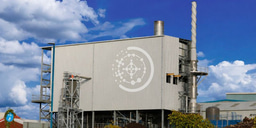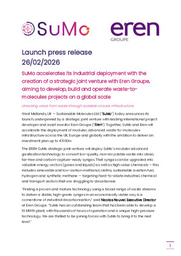The UK doesn’t need to lay waste to its green targets to capture growth

The start of the year has seen a renewed focus on whether the UK Government can deliver economic growth alongside its climate commitments.
It has recently formally committed to reduce the nation’s carbon footprint by 81% by 2035, while signalling support for major infrastructure projects, including the third runway at Heathrow, that have the potential to increase emissions in some parts of the economy.
The only way to reconcile these goals is through genuine carbon dioxide removals – with carbon capture and storage being the best tool at the Government’s disposal to achieve this.
It has been identified as an essential technology by the Climate Change Committee, the independent group that advises the Government on the UK’s net zero pathway. The Committee’s seventh carbon budget, published last week, underscores the urgent need to commercialise carbon capture and storage in order to meet the country’s legally binding climate commitments.
It is also a proven technology. There are now around 50 commercial capture facilities in operation globally, with a total annual capture capacity of more than 50 Mt CO2.
The UK is in a privileged position. It has over a third of Europe’s carbon storage capacity. A fully developed carbon capture and storage industry would enable the UK to boost infrastructure growth and prosperity, while ensuring energy security and delivering net zero. According to a recent report by the Confederation of the British Industry, carbon capture and storage is one of the key emerging sub-sectors of the net zero economy.
But we need to move quickly to deploy the technology at scale.
Surprisingly, the Energy from Waste sector can help make this happen. Our industry takes non-recycled waste, safely treats it by incineration, and uses the heat to generate power – around 3% of Britain’s power needs.
Energy from Waste keeps waste from going to landfill (the only viable alternative for non-recycled waste). Landfills are serious emitters of the highly damaging greenhouse gas, methane.
My company, Viridor, is already investing in carbon capture technology on our largest facility in Runcorn, North West England. Once operational, the plant will capture nearly one million tonnes of CO2 each year and decarbonise Greater Manchester’s residual waste, helping it meet its Climate Emergency targets.
By combining carbon capture with Energy from Waste facilities, we avoid landfill, fully decarbonise waste treatment, and generate green power. But what is more, Energy from Waste captures both fossil emissions and carbon from the natural cycle, like food waste. Capturing these natural emissions generates CO2 removals that are essential to balance out emissions from other sectors, like aviation.
There are around 30 more Energy from Waste facilities well-positioned to store their carbon emissions by 2035. Fitting these with carbon capture and storage would generate enough CO2 removals to more than cover all the emissions of a third runway or all that were needed to balance gas emissions for a clean power grid (over 6 million tonnes of removals a year).
Implemented nationwide, Energy from Waste could deliver 10 million tonnes of CO2 removals every year by 2050, enough to balance the emissions of all flights leaving Gatwick, Manchester, Stansted and Luton combined.
This is not just a climate opportunity. Investment in carbon capture and storage on Energy from Waste facilities could also generate up to £40bn of gross value added to the UK economy and 14,000 green jobs by 2050. Importantly, rolling out carbon capture in the waste sector is one of the most cost-effective ways to utilise the technology, which will help bring it to commercial maturity, reducing the need for taxpayer support.
This gives the UK what it needs to double down on growth and make genuine progress in removing carbon dioxide from the atmosphere, all from the things we throw in the bin.
The Government can marry net zero commitments and growth, and make the UK a leader in green technology, if it unlocks the deployment of carbon capture and storage on the projects that will generate the most impact overall.
In fact, it would be a completely wasted opportunity if we didn’t.
Viridor are the 2025 Energy from Waste Conference platinum plus sponsors. Make sure you sign up to EfW Net today, to access presentations after the conference.





Please sign in or register for FREE
If you are a registered user on Energy from Waste Network, please sign in